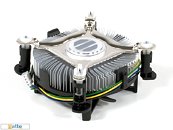There is no such thing as element-specific "heat dissipation factor".
no, but there is "thermal resistance," and copper's is lower than aluminium. so there.
Meaning copper is superior for cooling appliances by all attributes. Except for raw material price.
Your point eludes me.

material with more thermal resistance will take longer to heat up and longer to cool down because it is resistant to thermal changes, so in that matter it would take longer/shorter depending for the heat to dissipate.
Not exactly.
Thermal resistance only affects how well a given material conducts heat. It
alone has no impact on how long a time it takes to heat/cool a mass of an object from AºC to BºC - atleast not for low-mass/volume objects like heatsink fins.
niko084 said:
copper gets warm slowly while the aluminum fins with the fan on it stays cool to cool the heat pipes and keep them at a solid temperature.
Why do the fins stay cool? And
for how long?
What you're talking about is thermal capacitance (tc). Alu has much higher tc compared to copper, but for use in electronics' heatsinks higher
tc has no purpose at all as the only scenario a high tc would be beneficial would be a situation where the time heat was "injected" was non-continuous. Continuous heat loads, that for example, CPUs produce causes the aluminum fins' temperature to raise to a point where it is almost on-par to that of the copper heatpipes
but due to inferior heat conductivity a tempereture gradient will form between the heatpipe-fin contact point and the far-end of the fin. An all-copper heatsink would spike the temps more quickly but it would max at a lower ºC for both the cooled chip & the heatsink itself. HS with copper base&pipes+alu fins would have a slower temperature climb but both the chip&heatsink would max a few ºC higher than the one made of copper.
Infact, a material with extremely poor heat capacity and high conductivity would be an ideal heatsink material as it would heat up quickly thus making more efficient use of it's surface area. carbon nanotubes being an example of such a material.
Another ideal HS material would be the opposite: an "exotic material" with
insane thermal capacity that it would just absorb all the heat injected in it thus warming up very, very slowly. By "exotic material" (with
insane heat capacity) I mean that such material doesn't
exist.

















 I hope you guys all did alright in high school physics.
I hope you guys all did alright in high school physics. 
